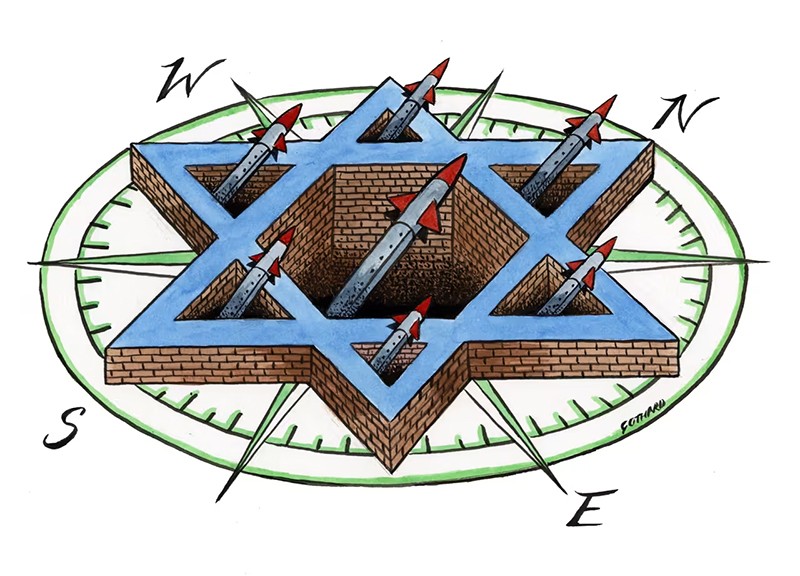
The question is now or later. Strategy argues for now, even if the politics might be better later.
By Seth Cropsey, WSJ
Israel faces a strategic choice with regard to Iran—war now or war later. The political conditions for war now are poor. The strategic conditions later will only grow worse.
Iran’s goal is to destroy Israel as a uniquely Jewish state through a strategy of attrition. The mullahs hope to bind Israel in a series of conflicts and pressure it from multiple angles while using diplomacy and media manipulation to prolong the conflict. Tehran understands the potency of Israel’s military, which has adapted well to difficult urban and subterranean combat conditions in Gaza. The Israel Defense Forces field formidable air, artillery and armored units that, if unleashed in the north, would threaten the existence of Hezbollah, Iran’s most capable proxy. The Iranian deterrence strategy couples pressure on the U.S. with the threat of large-scale rocket and missile attacks against critical Israeli infrastructure.
Hamas is the most apparent element of Iran’s strategy. Iran wants the terrorist organization not only to maintain control of Gaza but to catapult itself into control of the Palestinian movement. The best way to do that is to compel the Israelis to accept a cosmetically appealing “peace agreement” involving the Arab states that allows Hamas to integrate into the Palestinian Authority and co-opt its necrotic rival, Fatah. The West Bank could then become another axis of pressure on Israel.
The only way for Israel to prevent this is through a de facto occupation of Gaza. Israel must demonstrate to Gazans that whatever the formal governing authority in the territory, the IDF won’t allow Hamas or a similar terrorist organization to return. As in all totalitarian regimes, Hamas has created overwhelming incentives for cooperation, and killed all possible opposition. Only by demonstrating staying power can the IDF break this cycle and encourage an alternative political structure.
Iran understands this and has activated a network of global Islamist sympathizers to ramp up public pressure on Israel. The goal is to get Western politicians to back a ceasefire that will achieve Iranian objectives. By slowing the conflict down and splitting Israel from the U.S. and its allies, Iran aims to make Israel an international pariah. In the mullahs’ wildest dreams, migration would hollow out Israel, setting the stage for its conversion from a Jewish State into an Arab Islamic one.
Since the mid-2000s, Israel’s Iran policy has been one of deferred confrontation. Israel built the Iron Dome air-defense system to destroy low-tech rocket and mortar salvos from the West Bank, Gaza and Lebanon, mitigating the need for ground operations in all but the worst circumstances. Throughout the 2010s, Israel executed a persistent air campaign in Lebanon, Syria and Iraq to interdict Iranian supply lines. Israel also conducted cyberattacks, sabotage efforts and assassinations in Iran to hamper Tehran’s nuclear ambitions. Nothing worked to eliminate the threat, but the strategy bought time and established a balance of forces that discouraged aggressive action. This balance was upended on Oct. 7. The only way to reset it is by eliminating one of Iran’s threats. The obvious candidate is Hezbollah.
By manipulating the U.S. into restraining Israel, Iran hopes to keep Israel frozen and slowly erode its will. At some point in the coming months, Iran expects a cease-fire that will allow it to capture the West Bank and threaten Israel’s existence.
Israel isn’t the first power faced with an unpleasant choice between undermining an alliance relationship and acting decisively against a threat. France had a similar dilemma in the 1930s. From 1935 through 1940, France balked at acting alone against Nazi Germany even though it had several opportunities to do so with reasonable chances of success. The French political establishment assumed that when war with Germany came, France would fight alongside Britain in a revived Entente Cordiale. France ended up facing the German threat in 1940 in its preferred strategic format. Paris fell regardless.
Israel’s situation is remarkably similar. The Jewish state is small and vulnerable. Lacking naval forces to protect its maritime depth, Israel requires American military resupply and relies on the U.S. to deter other great-power interventions. Yet this has become a strategic straitjacket, in part because of poor Israeli communication but primarily because of American strategic irrationality. The result is a growing assumption that war in Lebanon can be deferred until next year, once the U.S. president is free of political pressure, and ideally with a friendlier administration in the White House.
Yet Israel doesn’t have another year. The longer it waits to move on Hezbollah, the more likely a real rupture with America becomes. Constant mobilization is eroding military and economic morale in Israel. There should be rapid action in the north, with or without American approval. It should take the form of a large-scale air campaign that hits Iranian command nodes and Iranian allies in Syria and Lebanon. The strategic conditions aren’t ideal, but waiting won’t make them any better.
Mr. Cropsey is president of the Yorktown Institute. He served as a naval officer and as a deputy undersecretary of the Navy and is author of “Mayday” and “Seablindness.”














